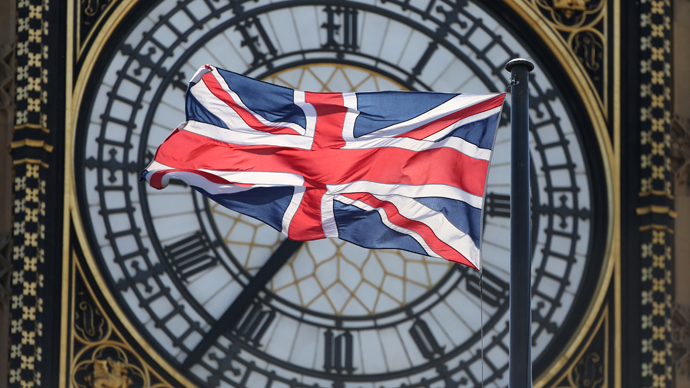Election 2015: The bias of UK print media is breathtaking

Anybody walking into a London newsagent this weekend could be forgiven for thinking that the newspapers have been replaced by party political posters. Fleet Street’s lack of balance is staggering.
The klaxon has been sounding for years. British newspaper sales are currently falling at a rate of more than 8 percent annually. In fact, the now defunct News of the World sold more copies 25 years agothan the 10 nationally distributed London-based Sunday titles can muster together today.
Take the Guardian for example. Staffed by a group of hacks who've chosen to follow Oscar Wilde's advice on self-worship, it’s obsessed with its own importance. However, its circulation figures are somewhat more sobering. The pompous bastion of liberalism sells 176,000 copies per edition. By contrast, Hello! magazine shifts 276,000.
Proprietors and editors almost universally attribute the collapse of their industry to the rise of the internet. This is much too simplistic. In reality, standards have slipped dramatically in recent years, accelerating the decline. Editorial content is being ripped to shreds by bean counters, creating a vicious circle. With less pagination and staff to generate palatable copy, sales fall even faster leaving less cash to arrest the downward spiral. Facts are no longer sacred and views trump news.
The web delusion
The focus has switched to the holy grail of the web, which shows all the signs of being a fool's paradise. A world where reporters don’t leave the building - instead they churn out re-writes of other publication’s copy or press releases. And sub-editors are non-existent. Unless newspapers urgently re-evaluate their direction, the format will soon be dead. Replaced by the citizen journalism nonsense where (often anonymous) numskulls sit around geo-tagging news in their pajamas.
Armed with the knowledge that their very existence is in peril, you’d expect Fleet Street’s finest to use the spotlight Election 2015 gives them to try some radical changes, wouldn’t you? The logical course would be to listen to lapsed readers who’ve abandoned the printed press and younger ones who’ve never bought newspapers. Then, to use the findings to innovate and change direction, perhaps even dragging their titles into the 21st century.
Rather than make use of the left side of their brains, they’ve given even more credence to the right hemisphere. More bias, more emotion. The parochialism turned up to 11. It’s the British version of Seppuku, a Japanese ritual suicide by disembowelment. Instead of reaching for the future, editors are channeling their inner Kelvin McKenzie and cerebrally dancing like it’s 1985, not 2015. When McKenzie edited The Sun, it sold close to 4 million copies daily (in 1987). Today it flogs a mere 1.97 million.
Children of the revolution
Just as a young Rupert Murdoch once used the Sun to revolutionize British journalism, proprietors desperately need a new vision right now. I expected to see signs of it during this election campaign, instead old habits seem to be more entrenched than ever. For those who love newspapers, it’s painful to watch them slowly die.
Let’s look at some front pages from last week. The Daily Mail has long been an unapologetic supporter of the Conservative Party. While it has frequently derided Labour in the past, I don’t recall it being as vicious as it is here. Using the least flattering screen-grab possible, it tears into Russell Brand and Ed Miliband. For the record, Brand has 10 times more Twitter followers than the Daily Mail.
Wednesday's Daily Mail: "Ministers' shame on killer salt" pic.twitter.com/LkpuoRksZo#BBCPapers#tomorrowspaperstoday (via @suttonnick)
— BBC News (UK) (@BBCNews) April 28, 2015
The Daily Star, owned by UKIP acolyte Richard Desmond, also lays into the pair. Describing the Labour leader as ‘Red Ed.’ While slightly left of center, Miliband is hardly a kindred spirit of Castro.
Wednesday's Daily Star front page: Red Ed & Brand talk total ballots #tomorrowspaperstoday#bbcpaperspic.twitter.com/1ecGFwZntG
— Nick Sutton (@suttonnick) April 28, 2015
A day earlier, the Daily Mail went further than the ‘Red Ed’ insult. They went the whole hog and inferred that he was a 'Stalinist.'
Tuesday's Daily Mail: "Miliband the land-grabber" pic.twitter.com/3dWJt4DwMw#BBCPapers#tomorrowspaperstoday (via @suttonnick)
— BBC News (UK) (@BBCNews) April 27, 2015
The Sun, which fervently backs David Cameron’s Tories, joined in with a slur on Miliband’s mental health.
Unbelievable from the Sun - call that cider? MT @suttonnick: Wednesday's Sun front page: pic.twitter.com/c1u5Giiv4K
— hilaryosborne (@hilaryosborne) April 28, 2015
That headline was sandwiched between two astonishing front pages. In the first, the Sun, owned by the billionaire Rupert Murdoch, used an ‘ordinary bloke’ to convey its master’s message.
THE SUN FRONT PAGE: "White van Dan: Cam's my man" #skypaperspic.twitter.com/geegscz9vK
— Sky News (@SkyNews) April 27, 2015
Two days later, the red-top attempted to instruct its readers to vote Tory.
THE SUN FRONT PAGE: The Sun's 2015 election verdict: It's a Tory. #skypaperspic.twitter.com/RJLBQdweH4
— Sky News (@SkyNews) April 29, 2015
On the other side of the divide, the Mirror (the last tabloid loyal to Labour) is equally adept at agitprop. Here it plays its usual ‘heartless Tory’ card.
Tuesday's Daily Mirror front page - Tory MP: Make people wait LONGER at A&E #tomorrowspaperstoday#bbcpaperspic.twitter.com/rYMMJeUbFD
— Nick Sutton (@suttonnick) April 27, 2015
Meanwhile, last Sunday the Mail On Sunday delivered a piece of propaganda that would have earned the editors at Pravda the deposit on a new Volga car, in 1972.
The front page of the Mail on Sunday is misleading. For a start you need 500 Mail points to get a free M&S chicken. pic.twitter.com/skbxzFAL07
— Jason Spacey (@Jason_Spacey) April 26, 2015
Not to be outdone, the Guardian has also shed any presence of neutrality. On Saturday, it publicly backed Labour.
The Guardian endorses Labour: Britain needs a new direction, Britain needs Labour http://t.co/IvyrtjOLJ3#GE2015pic.twitter.com/yFIiJ3vU3f
— The Guardian (@guardian) May 1, 2015
The last chance saloon
To my foreign eyes, the partiality of the UK’s newspapers is truly astounding. It’s the kind of thing you’d expect to find in a third-world dictatorship, not an advanced economy and established G8 member. Indeed, I’ve been present for elections in Germany, Russia and the USA and while certain outlets in those countries heavily lean towards particular parties or personalities, I’ve never encountered anything like this.
At a time when newspapers are on life-support, editors appear to be oblivious. What’s worse is they seem to perceive their organs as being far more influential than they actually are. Readers continue to drift away from the propaganda, turning instead to alternative media outlets for, at least on the surface, less partisan coverage.
Shunning what should have a been a glorious opportunity for re-invention, the only thing that appears to have changed in newspapers during election 2015 is that the Express seems to be backing UKIP, breaking the Tory-Labour monopoly on Fleet Street support. The Daily Mail is staying loyal to the Conservatives, but seems to resent Cameron’s liberal stance. Expect the Mail to cosy up to UKIP in due course. After all, it wouldn’t be the first time the newspaper was attracted to a rightwing grouping.
This was a pivotal election for the print media. Come the next poll in 2015, I suspect no UK title will sell more than 1 million copies, even in the Sunday market. Newspapers are on the verge of capsizing and sliding into irrelevance. Sadly, I fear they've just missed the last chance to right the ship.
The statements, views and opinions expressed in this column are solely those of the author and do not necessarily represent those of RT.
The statements, views and opinions expressed in this column are solely those of the author and do not necessarily represent those of RT.













